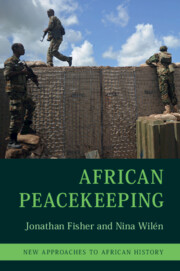Book contents
- African Peacekeeping
- New Approaches to African History
- African Peacekeeping
- Copyright page
- Contents
- Figures
- Maps
- Tables
- Acknowledgements
- Abbreviations
- Introduction
- Chapter 1 The (Pre-)History and Evolution of African Peacekeeping
- Chapter 2 New Means of Staying in Power
- Chapter 3 From the Local to the Global
- Chapter 4 Constructing a New Identity as a Peacekeeper
- Chapter 5 From Peacekept to Peacekeeper
- Chapter 6 What Is ‘African’ about African Peacekeeping?
- Chapter 7 Conclusion
- Index
Chapter 7 - Conclusion
Published online by Cambridge University Press: 13 January 2022
- African Peacekeeping
- New Approaches to African History
- African Peacekeeping
- Copyright page
- Contents
- Figures
- Maps
- Tables
- Acknowledgements
- Abbreviations
- Introduction
- Chapter 1 The (Pre-)History and Evolution of African Peacekeeping
- Chapter 2 New Means of Staying in Power
- Chapter 3 From the Local to the Global
- Chapter 4 Constructing a New Identity as a Peacekeeper
- Chapter 5 From Peacekept to Peacekeeper
- Chapter 6 What Is ‘African’ about African Peacekeeping?
- Chapter 7 Conclusion
- Index
Summary
This brief, concluding chapter draws together the main themes and arguments of the book and the ways in which peacekeeping has become embedded in the contemporary history and politics of large parts of the African continent. The chapter also reflects on the future of African peacekeeping. In doing so, it points to two trajectories relating to political systems and 'new' and 'old' peacekeepers. The authors underscore the different ways in which peacekeeping has interacted with domestic and regional politics in countries and regions governed by authoritarian versus democratic governments. Peacekeeping has played a particularly critical role in the former, it is suggested, where it has been incorporated into practices of illiberal, militarised statebuilding. The authors conclude the chapter, and book, by pointing to the relatively rapid emergence of a 'new generation' of African peacekeeping states since the early 2000s and the implications this has for the future of African peacekeeping itself.
Keywords
- Type
- Chapter
- Information
- African Peacekeeping , pp. 225 - 231Publisher: Cambridge University PressPrint publication year: 2022

